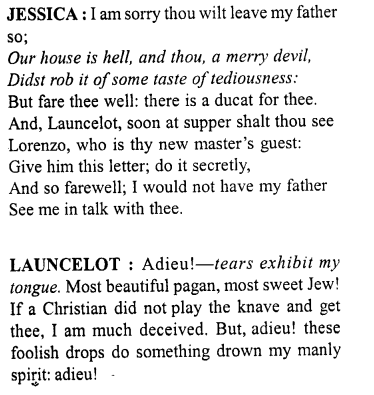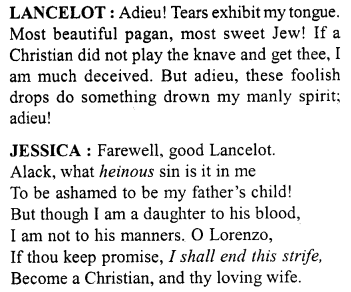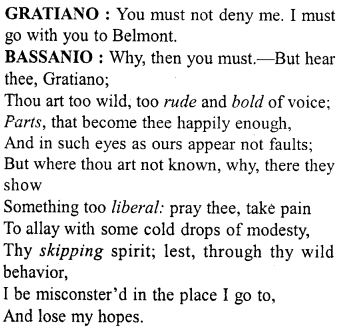Merchant Of Venice Act 2 Scene 3 Questions And Answers
ICSE SolutionsSelina ICSE SolutionsML Aggarwal Solutions
EnglishMathsPhysicsChemistryBiology
Act 2 Scene 3 Merchant Of Venice Workbook Important Questions and Answers
Passage – 1 (Act II, Sc.III, Lines 1-14)

Paraphrase :
JESSICA : I am sorry that you will leave my father like this : Our house is hell, and you, a happy devil, Robbed it of some taste of boredom. But goodbye; there is a ducat for you; And, Launcelot, you will soon see Lorenzoat supper, who is your new master’s guest: Give him this letter; do it secretly. And so, goodbye. I wouldn’t have my father See me talking with you.
LAUNCELOT : Goodbye! Tears exhibit my voice. Most beautiful pagan, most sweet Jew! If a Christian doesn’t play the rogue and get you, I am much deceived. But, goodbye! these foolish drops drown my manly spirit somewhat; goodbye!
Word Meaning With Annotation
Our house is hell, and thou, a merry devil : our home has been as miserable as hell, but enlivened somewhat by the presence of such a merry fellow as yourself. Didst rob it of some taste of tediousness : who relieved the monotony a little, tears exhibit my tongue : emotion keeps him from speaking.
Read the above passage and answer the following questions
Question 1.
Can you give reasons why Launcelot is leaving Jessica father? Why is Jessica’s house a hell?
Answer:
In an earlier scene, Launcelot explains why he is leaving Shylock to Join Bassanio. Bassanio wonders why he should leave a rich master to join a poor gentleman like Bassanio, Launcelot replies wittily. He quotes a proverb which says that grace of God is better than all the wealth of the world. Bassanio has the grace of God and Shylock all wealth. Launcelot prefers to join the service of a person with a human heart. Shylock’s house is a miserable place to live in. So it is a kind of hell.
Question 2.
Who is called a “merry devil”? Why is Jessica sorry that he is leaving Shylock’s house?
Answer:
Launcelot is called a ‘merry devil’. He is a poor person with a cheerful, jovial disposition and a devil-may-care attitude.
Jessica is sorry that Launcelot is leaving Shylock’s house. His presence has been a source of fun and joviality. His absence from there will leave the house a dull place.
Question 3.
Why does Jessica give a ducat to Launcelot? To whom is Launcelot to hand over the letter? Why is he told to hand over the letter secretly?
Answer:
Jessica gives a ducat to Launcelot as his reward for carrying his secret letter to her lover Lorenzo. The letter is to be handed over to Lorenzo. Launcelot is told to hand it over secretly lest . anyone should know about their secret love affair.
Question 4.
Why is meant by : “Didst rob it of some taste of tediousness?” What does this statement, indicate about Shylock and his household?
Answer:
Launcelot’s witty remarks and funny observation relieved Shylock’s miserable house of its dreariness. This statement indicates that Shylock’s house was not a happy place to live in. The stone hearted Jew had reduced it to the condition of a hell on earth. Even Shylock’s daughter felt fed up with the atmosphere of the house.
Question 5.
What does this extract show about the character of Jessica? In what way does her character differ from that of Portia?
Answer:
Some critics have called Jessica a flighty girl. She is unsteady in her thoughts. She is not loyal to her father. She is sending secret communications to her lover Lorenzo. She is corrupting the servant of the house by making him an accomplice in her task. In this respect she. differs from Portia who is ready to obey the will of her dead father in the matter of choosing her husband.
However, Jessica reveals herself as a sympathetic and loving kind of person, whom Launcelot describes as “most beautiful pagan, most sweet Jew”.
Question 6.
What does Launcelot means when he says : “If a Christian do no play the knave and get thee. I am much deceived:”
Answer:
Launcelot predicts that Jessica is a loving creature fit only to be married to a Christian. He believes that a Christian is likely to play mischief and induce her to run away with him. Perhaps, the servant knows something about the secret love affair/between Jessica and Lorenzo.
Passage – 2 (Act II, Sc.III, Lines 10-20)

Paraphrase :
LAUNCELOT : Goodbye! Tears exhibit my voice. Most beautiful pagan, most sweet Jew! If a Christian doesn’t play the rogue and get you, I am much deceived. But, goodbye! these foolish drops drown my manly spirit somewhat; goodbye!
JESSICA : Goodbye, good Launcelot. It’s a pity, what hateful sin it is in me To be ashamed to be my father’s child! But, although I am a daughter from his blood, I am not from his manners. Oh, Lorenzo! If you keep your promise, I shall end this strife, Become a Christian and your loving wife.
Word Meaning With Annotation
Exhibit : mistake for inhibit (check), heinous : deedly. I shall end this strife : Jessica has been divided between loyalty to her father and love for Lorenzo; now she declares that the latter has won.
Read the above passage and answer the following questions
Question 1.
What was the occasion for the dialogue quoted above?
Answer:
Lancelot has obtained a place among the servants of Bassanio. Here he is bidding farewell to young Jessica who is sad at Lancelot leaving her house. Lancelot tells her that in his sorrow even words are failing him.
Question 2.
Who is the ‘beautiful pagan’ mentioned in the first sentences of the first speech of the dialogue?
Answer:
Lancelot refers to Shylock’s daughter Jessica as the ‘beautiful pagan’. The word pagan means one who is not a Christian. Since Jessica is a Jewess, She is referred to as the ‘most beautiful pagan’.
Question 3.
Explain the meaning of the phrase “if a Christian do not play to knave and get thee, I am much deceived”.
Answer:
Lancelot says to Jessica that some Christian will do a smart thing and carry you away. He believes that some Christians would play mischief and acquire Jessica as his wife.
Question 4.
What inference can you draw from the above dialogue about the speakers.
Answer:
From the above dialogue it is clear that both Lancelot and Jessica are sad of being separated from each other. The speakers are very emotional. Lancelot finds it difficult to refrain his tears and says that they are making him loose something of his manly nature.
Question 5.
What light does the above dialogue throw on the character of Jessica?
Answer:
The above dialogue shows that she is not a daughter devoted towards her father. She is devoid of any love that a daughter usually has for her father. She is ashamed of being Shylock’s daughter. We also come to know that she is in love with a Christian called Lorenzo whom she wishes to marry.
Passage – 3 (Act II Sc. III, 157-169)

Paraphrase :
GRATIANO : You mustn’t say no: I must go with you to Belmont.
BASSANIO : Why, then you must go. But listen, Gratiano ; You are too wild, too rude, and loud, Qualities that become you happily enough, And, in such eyes as ours, don’t appear to be faults; But where no one knows you, why there, these qualities Show something that’s too liberal. Please, take pains To behave yourself and to control Your wild spirit, so that I won’t be misunderstood As to why I came, because of your wild behavior, And lose my hopes of marriage.
Word Meaning With Annotation
Rude : rought in manner. Bold : loud. Parts : qualities. Liberal : bold, free. Skipping : lively, fully
Read the above passage and answer the following questions
Question 1.
Gratiano makes some request to Bassanio. But he seems to doubt if his request will be granted. Why does Gratiano have such doubts?
Answer:
Gratiano has learnt that Bassanio is making preparations to go to Belmont to try his luck in the game of lottery. He makes a request to Bassanio to let him accompany to that place.
Gratiano doubts if his request will be granted. He is not sure if Bassanio will consider it proper to lake a non-serious man like Gratiano with him on a serious business like winning the hand of a beautiful rich lady.
Question 2.
Does Bassanio respond favourably? Does Bassanio have some reservations?
Answer:
Bassanio initially responds favourably. He agrees that Gratiano may accompany him to Belmont. But he does have his fears and reservations.
Gratiano is outspoken, rude and unmannerly. He is likely to be misunderstood in the company of those who do not know his real character. Gratiano fears that he may not create a wrong impression while in Belmont.
Question 3.
“Parts that become thee happily enough,
And in such eyes as our appear not faults;”
Explain what Bassanio means by saying slove lines.
Answer:
Gratiano is much loved by his friends. His talkative habit and coarse wit amuse people like Bassanio. So his frankness and wild nature do not look like faults to his friends.
Question 4.
What is Gratiano advised to do when he is in the company of strangers?
Answer:
Bassanio advises Gratiano to mend his too wild behaviour. He must moderate his wild spirit with a bit of modesty. This he must do while in the company of strangers at Belmont.
Question 5.
In what way can Gratiano’s behaviour harm the interests of Bassanio at the place where they are planning to go?
Answer:
Bassanio is afraid lest Gratiano’s acts of wild behaviour among strangers should belittle Bassanio’s position and lessen his chances of success in his mission. Bassanio intends to create the best of impression at Belmont where he is going to win the heart of Portia.
Merchant of Venice Workbook Questions and Answers
- Merchant of Venice Act 1 Scene 1 Workbook Answers
- Merchant of Venice Act 1 Scene 2 Workbook Answers
- Merchant of Venice Act 1 Scene 3 Workbook Answers
- Merchant of Venice Act 2 Scene 1 Workbook Answers
- Merchant of Venice Act 2 Scene 2 Workbook Answers
- Merchant of Venice Act 2 Scene 3 Workbook Answers
- Merchant of Venice Act 2 Scene 5 Workbook Answers
- Merchant of Venice Act 2 Scene 6 Workbook Answers
- Merchant of Venice Act 2 Scene 7 Workbook Answers
- Merchant of Venice Act 2 Scene 8 Workbook Answers
- Merchant of Venice Act 2 Scene 9 Workbook Answers
- Merchant of Venice Act 3 Scene 1 Workbook Answers
- Merchant of Venice Act 3 Scene 2 Workbook Answers
- Merchant of Venice Act 3 Scene 3 Workbook Answers
- Merchant of Venice Act 3 Scene 4 Workbook Answers
- Merchant of Venice Act 3 Scene 5 Workbook Answers
- Merchant of Venice Act 4 Scene 1 Workbook Answers
- Merchant of Venice Act 5 Scene 1 Workbook Answers
